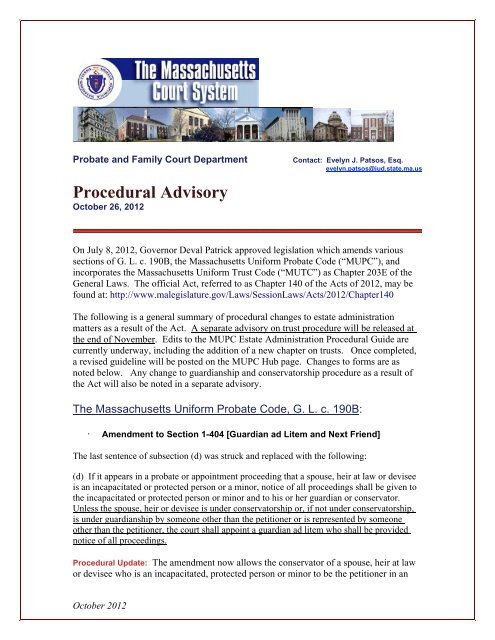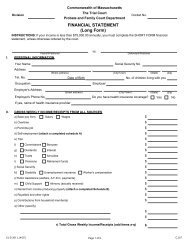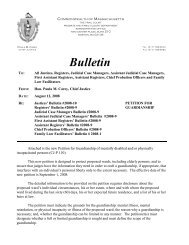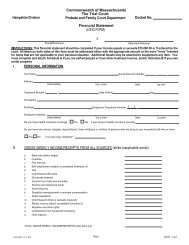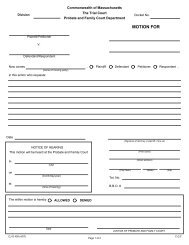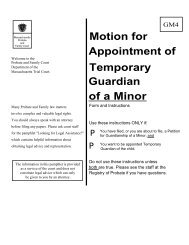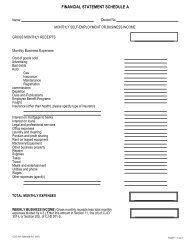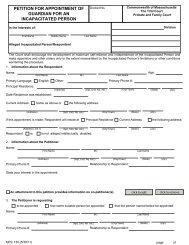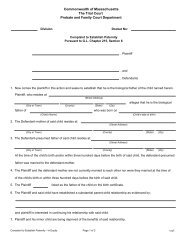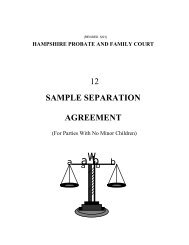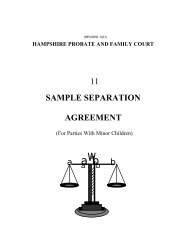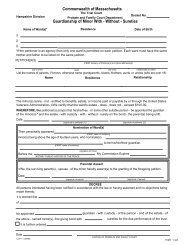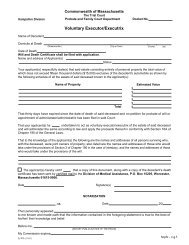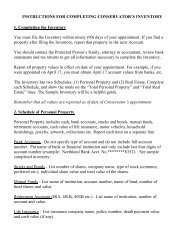Procedural Advisory - Barnstable County Probate and Family Court
Procedural Advisory - Barnstable County Probate and Family Court
Procedural Advisory - Barnstable County Probate and Family Court
You also want an ePaper? Increase the reach of your titles
YUMPU automatically turns print PDFs into web optimized ePapers that Google loves.
<strong>Probate</strong> <strong>and</strong> <strong>Family</strong> <strong>Court</strong> Department<br />
<strong>Procedural</strong> <strong>Advisory</strong><br />
October 26, 2012<br />
Contact: Evelyn J. Patsos, Esq.<br />
evelyn.patsos@jud.state.ma.us<br />
On July 8, 2012, Governor Deval Patrick approved legislation which amends various<br />
sections of G. L. c. 190B, the Massachusetts Uniform <strong>Probate</strong> Code (“MUPC”), <strong>and</strong><br />
incorporates the Massachusetts Uniform Trust Code (“MUTC”) as Chapter 203E of the<br />
General Laws. The official Act, referred to as Chapter 140 of the Acts of 2012, may be<br />
found at: http://www.malegislature.gov/Laws/SessionLaws/Acts/2012/Chapter140<br />
The following is a general summary of procedural changes to estate administration<br />
matters as a result of the Act. A separate advisory on trust procedure will be released at<br />
the end of November. Edits to the MUPC Estate Administration <strong>Procedural</strong> Guide are<br />
currently underway, including the addition of a new chapter on trusts. Once completed,<br />
a revised guideline will be posted on the MUPC Hub page. Changes to forms are as<br />
noted below. Any change to guardianship <strong>and</strong> conservatorship procedure as a result of<br />
the Act will also be noted in a separate advisory.<br />
The Massachusetts Uniform <strong>Probate</strong> Code, G. L. c. 190B:<br />
· Amendment to Section 1-404 [Guardian ad Litem <strong>and</strong> Next Friend]<br />
The last sentence of subsection (d) was struck <strong>and</strong> replaced with the following:<br />
(d) If it appears in a probate or appointment proceeding that a spouse, heir at law or devisee<br />
is an incapacitated or protected person or a minor, notice of all proceedings shall be given to<br />
the incapacitated or protected person or minor <strong>and</strong> to his or her guardian or conservator.<br />
Unless the spouse, heir or devisee is under conservatorship or, if not under conservatorship,<br />
is under guardianship by someone other than the petitioner or is represented by someone<br />
other than the petitioner, the court shall appoint a guardian ad litem who shall be provided<br />
notice of all proceedings.<br />
<strong>Procedural</strong> Update: The amendment now allows the conservator of a spouse, heir at law<br />
or devisee who is an incapacitated, protected person or minor to be the petitioner in an<br />
October 2012
informal or formal proceeding without triggering a m<strong>and</strong>atory appointment of a guardian<br />
ad litem for notice purposes.<br />
PRACTICE ALERT: If the conservator of an incapacitated person, protected person or a<br />
minor has an interest in the decedent’s estate as an heir or devisee, the conservator must<br />
file an affidavit stating specific facts to warrant a conclusion by the magistrate that a<br />
conflict of interest does not exist between the conservator <strong>and</strong> person(s) represented in<br />
order to proceed administratively on an informal or uncontested formal petition. Failure<br />
to submit an affidavit or to state sufficient facts to support the conclusion that a conflict<br />
of interest does not exist may result in a denial by the magistrate.<br />
· Amendments to Section 3-108 [<strong>Probate</strong>, Testacy <strong>and</strong> Appointment<br />
Proceedings; Ultimate Time Limit]<br />
Subsection (4) exception: Subsection (4) of section 3-108 was struck <strong>and</strong> replaced with<br />
the following:<br />
(4) an informal appointment or a formal testacy or appointment proceeding may be<br />
commenced thereafter if no proceedings relative to the succession or estate<br />
administration has occurred within the 3 year period after the decedent’s death, but the<br />
personal representative shall have no right to possess estate assets as provided in section<br />
3-709 beyond that necessary to confirm title thereto in the successors to the estate <strong>and</strong><br />
claims other than expenses of administration shall not be presented against the estate;<br />
<strong>Procedural</strong> Update: The amendment allows a personal representative to be appointed<br />
informally or formally in an intestate estate <strong>and</strong> allows a will to be probated <strong>and</strong> a personal<br />
representative appointed formally in a testate estate, indefinitely if no proceedings occurred<br />
within the 3 year statute of limitations period. Although the time limit to commence a<br />
proceeding is unlimited (even beyond the pre-MUPC 50 year time limit), the authority<br />
granted under this exception is limited to confirming title <strong>and</strong> paying expenses of<br />
administration. No authority is granted to the personal representative to possess or distribute<br />
property, except to the extent necessary to confirm title, or to pay creditor claims.<br />
New: Subsection (5) exception: A new exception was added to section 3-108 in<br />
subsection (5). Subsection (5) provides:<br />
(5) a formal testacy proceeding may be commenced at any time after 3 years from the<br />
decedent’s death for the purpose of establishing an instrument to direct or control the<br />
ownership of property passing or distributable after the decedent’s death from one other<br />
than the decedent when the property is to be appointed by the terms of the decedent’s will<br />
or is to pass or be distributed as a part of the decedent’s estate or its transfer is otherwise<br />
to be controlled by the terms of the decedent’s will.<br />
<strong>Procedural</strong> Update: The new exception will permit a formal proceeding to probate a will<br />
after the 3 year time period from the decedent’s death has run for the limited purpose of<br />
establishing an instrument to direct or control the ownership of property. A proceeding<br />
October 2012
under this exception may be necessary in order to effectuate a clause in a will exercising<br />
a power of appointment granted in a trust.<br />
· Amendment to Section 3-301 [Informal <strong>Probate</strong> or Appointment<br />
Proceedings; Petition; Contents.]<br />
The last sentence in subsection (6) of section 3-301 was amended as follows:<br />
(6) A petition for appointment of a personal representative to succeed a personal<br />
representative who has tendered a resignation as provided in section 3-610, or whose<br />
appointment has been terminated by death or removal, shall adopt the statements in the<br />
petition which led to the appointment of the person being succeeded except as specifically<br />
changed or corrected, state the name <strong>and</strong> address of the person who seeks appointment as<br />
successor, <strong>and</strong> describe the priority of the nominee.<br />
<strong>Procedural</strong> Update: For informal successor proceedings, the nominee must have priority<br />
for appointment <strong>and</strong> not the petitioner. The petitioner may be the nominee seeking<br />
appointment as successor personal representative, but does not need to be. Priority for<br />
appointment as successor is determined in accordance with § 3-203.<br />
Form Update: The Petition for Informal Appointment of a Successor Personal<br />
Representative (MPC 255) <strong>and</strong> the Order for Informal Appointment of Successor Personal<br />
Representative (MPC 760) have been revised. The revised forms are dated 10/23/12 <strong>and</strong><br />
shall be accepted for filing on or after the release date of 10/26/12.<br />
· Adoption of Section 3-610 [Resignation by Personal Representative]<br />
New: Section 3-610 (formerly “reserved”) was adopted <strong>and</strong> provides:<br />
A personal representative may resign the personal representative’s position by filing a written<br />
statement of resignation with the court after having provided at least 15 days written notice to<br />
the persons known to be interested in the estate. If no one applies or petitions for appointment<br />
of a successor representative within the time indicated in the notice, the filed statement of<br />
resignation shall be ineffective as a termination of appointment <strong>and</strong> shall be effective only<br />
upon the appointment <strong>and</strong> qualification of a successor representative <strong>and</strong> delivery of the<br />
assets to such successor representative.<br />
<strong>Procedural</strong> Update: The adoption of section 3-610 now requires a personal representative to<br />
give at least 15 days written notice to persons interested in the estate of his/her intent to<br />
resign. There is no requirement to file proof of service with the <strong>Court</strong>. No action will be<br />
taken by the Magistrate or the <strong>Court</strong> with regard to the resignation until a successor is<br />
appointed. A resignation becomes fully effective upon the appointment <strong>and</strong> qualification of<br />
a successor <strong>and</strong> the delivery of estate assets to the successor PR.<br />
Form Update: The Statement of Resignation of a Personal Representative (MPC 264) has<br />
been revised. The form does not include or require a return of service. Proof of service is<br />
not required to be filed. There is no filing fee for this form. The revised form is dated<br />
10/23/12 <strong>and</strong> shall be accepted for filing on or after the release date of 10/26/12.<br />
October 2012
· Amendment to Section 3-617 [Special Personal Representative; Formal<br />
Proceedings; Power <strong>and</strong> Duties.]<br />
New: Subsection “(c)” has been added to 3-617 <strong>and</strong> provides:<br />
(c) Unless otherwise ordered by the court, the authority of any personal representative<br />
previously appointed by the court or magistrate shall be suspended for as long as a special<br />
personal representative has authority.<br />
<strong>Procedural</strong> Update: There is no change in procedure or forms at this time.<br />
· Amendment to Section 3-706 [Duty of personal representative; inventory<br />
<strong>and</strong> appraisement.]<br />
New: Subsection (b) has been added to 3-706 <strong>and</strong> provides:<br />
(b) Within 3 months after appointment, a successor personal representative shall prepare an<br />
inventory of the property of the estate, listing it with reasonable detail <strong>and</strong> indicating the fair<br />
market value of each listed item as of the date of the successor personal representative’s<br />
appointment, <strong>and</strong> the type <strong>and</strong> amount of any encumbrance that may exist with reference to<br />
any item.<br />
<strong>Procedural</strong> Update: A successor personal representative is now statutorily required to<br />
prepare an inventory within 3 months after his/her appointment. This section makes it<br />
clear that the inventory values to be used are as of date of appointment, not date of death.<br />
There is no requirement to file the inventory with the <strong>Court</strong>. If the inventory is filed with<br />
the <strong>Court</strong>, the successor personal representative may use the court promulgated Inventory<br />
form (MPC 854) <strong>and</strong> should select the “other” box on page 1 of the form to indicate that the<br />
inventory is being filed by the successor personal representative.<br />
· Amendment to Section 3-715 [Transactions Authorized for Personal<br />
Representatives; Exceptions.]<br />
New: Subsection (23½) has been added to section 3-715 to authorize a PR to:<br />
(23½) sell, lease or encumber to an arm’s length third party any real estate of the estate, or an<br />
interest in that real estate, for cash, credit or for part cash <strong>and</strong> part credit, with or without<br />
security for unpaid balances <strong>and</strong> whether the personal representative has been appointed<br />
formally or informally; the sale, lease or encumbrance shall be conclusive notwithst<strong>and</strong>ing<br />
section 3-302 or any contest of the informal probate proceeding, provided that: (i) if the<br />
decedent died without a will, a license has been issued under chapter 202; or (ii) if the<br />
decedent died with a will, either: (a) the will, probated formally or informally, empowered<br />
the personal representative to sell, lease or encumber that real estate or an interest in that real<br />
estate, or (b) a license has been issued under chapter 202.<br />
October 2012
<strong>Procedural</strong> Update: A license to sell real estate is no longer required if there is a power of<br />
sale in a will that is probated either informally or formally. A license is still required for<br />
intestate estates <strong>and</strong> when a will does not contain a power of sale. To date, REBA has<br />
not revised title st<strong>and</strong>ards. For procedures required by the L<strong>and</strong> <strong>Court</strong>, see<br />
http://www.mass.gov/courts/courts<strong>and</strong>judges/courts/l<strong>and</strong>court/<br />
October 2012


